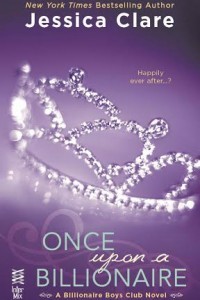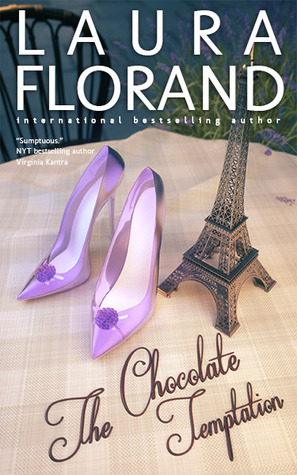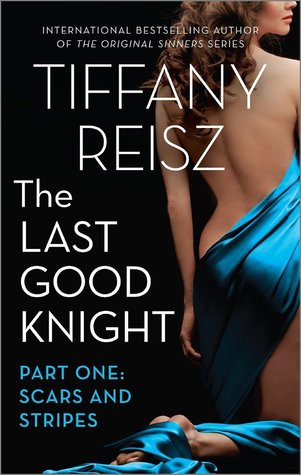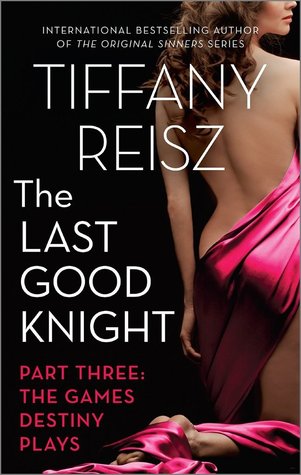My buddy Kim from Reflections of a Book Addict got me hooked on Jessica Clare’s Billionaire Boys Club series (which, just to interject, does make me think of the Babysitters Club books every single time I see the series name.) Check out our reviews of the other three books here, here, and here.
 The Billionaire Boys Club is a secret society of six men who have vowed success—at any cost. Not all of them are old money, but all of them are incredibly wealthy. They’re just not always as successful when it comes to love…
The Billionaire Boys Club is a secret society of six men who have vowed success—at any cost. Not all of them are old money, but all of them are incredibly wealthy. They’re just not always as successful when it comes to love…
As a member of the royal family in a small European country, Griffin Verdi’s presence is requested at the wedding of the century. The scholarly billionaire feels out of his depth in social situations, so a good assistant is required—especially when dealing with royal etiquette.
Unfortunately for Griffin, he’s stuck with Maylee Meriweather, a pretty, charming, and thoroughly unsuitable woman who doesn’t know a thing about high society—but she sure can kiss. Her lack of polish may sink Griffin, because after all, even his money can’t buy class. But through Maylee’s eyes, he’s starting to appreciate the simple things in life—if simple means the most complicated woman he’s ever met.
Maylee is everything Griffin isn’t—and everything he wants—if he can let down his guard and step outside his sheltered world…
Kelly: Months ago, Kim sent me a link to the blurb for this book, and I was like WHAAA?! Griffin and Maylee?!? And I was so worried that it would be terrible. I probably could have spared myself some of that worry, however, because it was pretty much predetermined that I would love the book (or force myself to love it) because I am clearly delusional and I fucking love stories about make-believe kingdoms (it might be Mr. Rogers’ fault) and rags to royalty stories and the like.
Kim: I shared Kelly’s apprehension about Once Upon A Billionaire mainly because of the heroine. We meet her in Beauty and the Billionaire as Hunter’s “hickish,” deeply Southern secretary. A woman who keeps her notes on Post-Its. Says gee-golly wizz….You get the idea.
Kelly: Don’t knock post-its! I keep my notes on them, too. In fact, I put post-its all over my monitors and desk. (And sometimes post-its end up on my butt. Don’t judge.)
Kim: HAHA I would never judge you. And Post-Its are great and all – I just don’t approve of them as your only way of schedule keeping, etc. (Especially when you’re the secretary for a man as busy as Hunter!)
Kelly: Well, maybe… but I’m an EA, too, and I’m just saying that extreme post-it usage is not necessarily a sign of workplace incompetence. I had no idea I felt so passionate about post-its. Right. Moving on (and butting out).
Kim: HA! Well Post-Its aside, I was nervous about this heroine being paired with Griffin, a Royal Viscount of a made-up country. He’s pretty particular about things and honestly has a stick up his ass most of the time. You can probably understand why Kelly and I felt nervous about reading Once Upon A Billionaire.
Kelly: To an extent, some of our fears about this book were realized. (More on that later.) But you know what? This book is so damn funny that I didn’t even care that there were some plot holes bigger than the state of Montana or that Griffin was kind of an assmunch or that Maylee is magically transformed from a hopeless, incompetent bumpkin with a penchant for informality to a stunningly efficient assistant overnight with seemingly no learning curve. You read that right: those things are all there, but they don’t matter so much once you start reading this book.
Kim: True story. The humor of this book is so strong, that it effectively allowed me as a reader to look past its flaws and just appreciate the story. The rags to riches Cinderella story should have pissed me off (Griffin buying Maylee clothes, telling her that her appearance was horrible, giving her a makeover/new hairstyle), but the humor of those situations (and probably the fact that it all backfires on Griffin) had me laughing through it, rather than raging.
Kelly: Kim and I may have mentioned a time or two that Gretchen (the heroine of Beauty and the Billionaire) is pretty much our favorite character in the history of ever. A significant portion of this book’s humor comes from Gretchen’s role in manipulating Griffin into hiring Maylee; sending vaguely abusive text messages to Griffin to remind him that he’s an asswipe; and yelling at him when he calls Hunter. Here’s a random sampling of Gretchen’s lines in this book:
“Wow, Griff, a pike up your ass and a foot in your mouth. That’s quite a feat.”
“Hey, I know…Why don’t you take another swig of ‘Shut the Hell Up’ and let me care for my man?”
Kim: While Gretchen does offer up many comedic moments in the book, it was ultimately Malyee that had me cracking up the most. At one point in the novel, while climaxing during sex with Griffin, she yells out “LORDAMERCY.” I guffawed out loud so hard that I spit out my tea and immediately started texting Kelly. Maylee’s southern manners mixed with Griffin’s uptight personality and Gretchen’s snark really helped move the book along.
Kelly mentioned before that there were large plot holes in this book and I have to agree. The main premise of the novel is that Griffin is heading to his (made up) home country for his cousin’s royal wedding. His assistant/dresser/manservant/butler person gets sick before the trip and Griffin therefore needs a new assistant to assist him. Kelly and I are still not sure why it was possibly apocalyptic that his mother find out that his one servant was sick.
Kelly: Oh, come on, Kim. If Griffin’s mother knew that Kip had the chicken pox, she would force Griffin to hire a whole bevy of staff, and Griffin’s just not that into hovering staff. (Never mind that he’s unable to dress himself, doesn’t understand how currency works, can’t drive anywhere because he has no sense of direction and GPS is for weenies, and seemingly lacks any kind of common sense about cause and effect. For example, it doesn’t even occur to him that people who want to eat in private should probably request private dining rooms and people who don’t want to be followed by paparazzi should probably not drive in cars that advertise “ROYAL FAMILY IN THIS CAR.”) Anyway, I’m just saying that Griffin’s need to show up with his own staff totally makes sense. Because, let me tell you, it’s a slippery slope from showing up at a royal event without an assistant to living in a 10,000 room mansion with 400,000 retainers. I’m not kidding. It happens just like that. And Griffin don’t play that.
Kim: Along with all that ridiculousness – can you explain to me how one gets lost in his own hometown? If Griffin lived with 100 servants all the time his inability to care for himself would make sense. But he’s been living with one assistant for several years. A thirty-something in today’s world that can’t figure out GPS? Or ATMs? It all rang a bit unrealistic.
Kelly: I am actually a little impressed that Griffin was able to operate buttons. Those things are fucking hard to use! My three-year-old can tell you all about it. She’s like, velcro and zippers are BOSS.
Kim: HA. Your daughter is smart. Velcro and zippers are BOSS. I guess we should probably discuss something positive about the book besides the humor now.
For me, I was a big fan of how this Cinderella story got turned upside down. Griffin spends so much time and energy attempting to make Maylee his kind of “presentable,” that it’s truly a shock to him when he realizes he’s succeeded and hates the result. He begins to understand that the perfectly quaffed, elegantly dressed, well-mannered woman he turns Maylee into is not at all what he wants. He misses the way she calls him Mr. Griffin instead of Lord Viscount (insert 10 more names here). He misses her outrageously large curls. And yes, he even misses her hand knit clothing.
Kelly: Yes, that was one of the more lovely parts of the story, that Griffin realizes that (1) he’s not nearly as awesome as he thinks he is; (2) wealth and the trappings of it are not always superior to everything and (3) it’s Maylee he loves, and all the things about her that make her special and individual, and those things are diminished when he tries to make her “perfect.” ALSO, he realizes that he’s kind of an asshat for even trying to mess around with her appearance and wardrobe, like she’s not good enough for him. (Gretchen helps with that discovery.)
Kim: Thank God for Gretchen! She’s helped a lot of the characters in this series realize they’re assholes.
Kelly: I’m a tiny bit ambivalent about one of my favorite things in this book. (How can that be? Don’t worry: I’ll explain.) Maylee seemed to undergo a fairly abrupt shift about a third of the way through the story, and that shift seemed to coincide with the reveal of Griffin’s interest in her (if ya know what I mean). That shift kind of bothers me, but I like SO MUCH what she became (hence the ambivalence). At the beginning of the book, Maylee is super timid, and she’s pretty intimidated by Griffin — especially after their less than auspicious meeting when she’s experiencing a xanax/alcohol interaction, calls him “Mr. Gryffindor” and demands hugs. Then Griffin kisses her, and all of a sudden she’s confident and comfortable with her own sexuality and more than willing to take the initiative with Griffin (if ya know what I mean). And — yes — those characteristics are all wonderful to see in a lady character (especially one in a billionaire romance novel), but it would have been better if she had exhibited those traits all along. I mean, it’s just a little too coincidental that Griffin’s kiss (he used to be a Prince, you know) is the thing that spurs all this character growth. Maybe he’s magic.
Kim: I completely get what you’re talking about. She looses some of her country “bumpkinness” and does in a way become a bit more refined. Her speech isn’t as drawling, her appearance is a bit more put together – yet her confidence level has gone through the roof. So as women shouldn’t we be happy that she’s become confident in herself? BUT at the same time, I’m bothered at what instigates the changes, just like Kelly. A sexual awakening is all well and good for a woman. But a sexual awakening caused by a man who keeps trying to change you? Not so great.
Kelly: Slightly less empowering.
Kim: Exactly where I was going with that.
In conclusion, I’m not sure I see Maylee and Griffin’s relationship “going-the-distance.” Their worlds are so much more than just financially opposite. Griffin’s family (specifically his mother) is so hardened against “commoners” that I don’t see her accepting of Griffin’s choice of Maylee. An interaction with Griffin’s family post their getting together would have helped me probably. But I guess that’s what future books are for, yeah?
Kelly: Yeah, and let’s just talk about the ending for a second. There were things I liked about it… Griffin had clearly been an asshat through much of the book, and it was satisfying that he had to chase Maylee, step out of his comfort zone and get Arkansas dust on his fussy shoes (I’m just guessing he wears fussy shoes… he seems the type). I particularly liked that Maylee doesn’t fully accept his apology right away — because he hurt her, and he damaged her trust in him, and that kind of thing can’t be magically repaired — but it’s a little strange how Clare makes it happen. I mean, I can imagine a whole host of reasonable responses to a clearly sincere, yet not quite enough, apology: “I need some time,” perhaps, or, “Let’s maybe slow this down a bit and work together to reestablish the trust that’s been lost.” Reasonable, right? Yeah, well, that’s not what happens.
Kim: Instead she agrees to come back and be his assistant, but ONLY until she can trust him. Then she’ll quit and just be with him.
Say wha?
You don’t trust the man….but you want to be financially beholden to him? And live with him? I don’t get it. Also, the way Clare writes the ending, I get the sense that Maylee is totally ok with being a trophy girlfriend/wife. It’s like as soon as her trust is earned again she’s ok with quitting her job and basically being his sex slave for life.
Kelly: And can we talk for just a second about how strange it is to agree to live with someone, to continue having sex with someone, and to insist on being employed by someone whom you don’t really trust? Like, totally strange for both parties. Why in the world would either of them be OK with that situation? And the thing that finally earns her trust? He throws her a party and invites a newspaperman from his home country. And Maylee’s like, OMG, you’re willing to let your family know about me? I’m not a dirty secret? I LOVE YOU FOREVER AND AM TOTALLY OVER HOW YOU WERE A RIDICULOUS ASSHAT. OBVS. YOU’VE CHANGED. Also, I QUIT.
Kim:YES! Can we speak about the party for a minute also? A huge conflict in this book is Griffin’s mother and her views on his life, commoners, etc. He falls in love with a girl who is basically EVERYTHING his mother hates. He throws the party as a way to introduce her to his friends, but ALSO as a way for his family to find out about her. How is there not a scene with the mother reacting to Maylee as a future daughter-in-law? That conflict builds and builds and builds for the whole book without ever cresting and reaching a conclusion.
Also, if I were Maylee I’d be pretty pissed that my new intended didn’t have the balls to tell his family about me himself.
Kelly: Oh Lordamercy, yes! It was such a strange (and disappointing) ending to what was otherwise a fairly problematic yet incredibly fun book.
Kim’s final thoughts: So in conclusion – What made this series special to me from the beginning was how it chose to not follow the protocol for billionaire romances. They were about strong-willed women who didn’t fall for money. They fell for the men behind the wallets. Once Upon A Billionaire was the complete opposite. Griffin offers Maylee $100,000 a year salary plus another $100,000 severance package and BOOM! They’re together again as employee/boss, girlfriend/boyfriend. What makes the series special was lacking here, and not even Gretchen’s sense of humor could save it.
Kelly’s final thoughts: Kim’s 100% right. I’m not gonna lie: I had a hell of a lot of fun reading this book. I was laughing my ass off left and right, sending Kim gleeful texts, and just enjoying the hell out of it. But when I stopped to think about the book, I realized that it has a lot of problems, and that I’m better off re-reading Beauty and the Billionaire for my much-needed dose of Gretchen awesomeness. I hold out hope for the final two books in the series that they reclaim the subversive glory of the first few books and turn out to be fun, interesting, and much less problematic.
*FTC Disclosure – I received an e-galley via NetGalley from Penguin Group in exchange for an honest review.*











 Part III: The Games Destiny Plays
Part III: The Games Destiny Plays
 Part V: The Last Good Night
Part V: The Last Good Night










